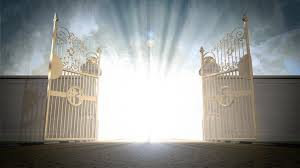Da – The Redemption of Isra’el 11: 25-36
The Redemption of Isra’el
11: 25-36
The redemption of Isra’el DIG: What is a mystery in the Bible? What mystery is Paul talking about here? In what sense is Isra’el’s stoniness only “to a degree?” How would you paraphrase God’s purpose in these verses? What is the ultimate hope for Isra’el? For Gentiles? How does this tie in with Paul’s teaching in 3:21-24? When Paul says, “For God’s free gifts and His calling are irrevocable,” what is he talking about? With Isra’el’s national regeneration, how will the circle, as it were, be complete?
REFLECT: When someone else receives God’s blessing and grace in their lives, does that spur you on to seek God all the more, or does it make you upset? If so, why? How has God blessed you by the fact that Isra’el has rebelled? What should be your response? Do you view Messianic believers as joint heirs to the kingdom, or foreigners in your land? How has ADONAI shown you mercy in your life? How can you respond, and show His mercy to others? What does God’s faithfulness to Isra’el have to do with you?
For God’s free gifts and His calling [of the Jewish nation] are irrevocable.
ADONAI’s setting Isra’el aside is not only partial and passing but also purposeful. YHVH temporarily set aside His chosen people in order to bring salvation to the Gentiles (11:11b), to make Isra’el jealous of them (11:11c) so they would yearn to receive the blessings of the Messiah they had rejected, and thereby be used to bring blessing to the rest of the world (11:12-15). But God’s ultimate , overriding purpose is to glorify Himself.303
The promise of Isra’el’s redemption. In 11:25 the word “for” points forward to the reason, given immediately, why Paul has presented the olive tree illustration (to see link click Cz – The Illustration of Isra’el’s Future). Paul uses the word brothers to emphasize that he considers not only Messianic Jews, but also Gentile believers to be his brothers in the faith, because he didn’t want any of them to be offended at what he was about to say next.
For, brothers, I don’t want you to be ignorant of this mystery (Greek: musterion), which God formerly concealed but has now revealed (11:25a). At the end of Paul’s letter, he defines mystery as being a revelation which has been kept secret for long ages past, but now is made known, and by the Scriptures of the prophets, according to the commandment of the eternal God (Romans 16:25-26; Ephesians 3:5-7 NASB). In this, both the Messianic Jews and the Gentile believers must grasp the fullness of their individual callings by ADONAI.
Why was this secret truth kept hidden for so long until Paul revealed it? Because one would have expected Isra’el to be the first nation to be saved. Isra’el had all the advantages enjoyed by no other people (see Cp – The Grief of Isra’el’s Past Paradox: Eight advantages that the Jews have). The Gospel itself is to the Jew especially (1:16), and YHVH has promised Jewish national salvation (Ezeki’el 36:24-36; Matthew 23:37; Acts 1:6-7). Why then, is God doing the unexpected, making the Gentiles joint-heirs (Ephesians 3:3-9) with the Jews? In order to give the fullest possible demonstration of His love for all humanity and not merely to the Jews.
But before Paul identifies and explains the particular mystery of which he is speaking here, he once again cautions the Gentiles against their pride, warning them to avoid twisting the truths of the mystery as being wise in their own eyes: So that you won’t imagine you know more than you actually do (11:25b). Proverbs 3:7 reminds us: Don’t be conceited about your own wisdom; but fear ADONAI, and turn from evil.
It is that stoniness, to a degree, that has come upon Isra’el (11:25c) it is a partial stoniness of the heart that has come upon Isra’el (11:25c). The stoniness is not total, because there has always been a remnant of Jewish believers trusting in Yeshua Messiah, the righteous of the TaNaKh. All Isra’el, including Messianic believers, is affected by this partial stoniness, for, as we shall see below, it delays Isra’el’s national salvation. This passage does not say that God caused the stoniness, as He hardened Pharaoh’s heart (Exodus 9:17-18); but it does imply that ADONAI knew it would happen. Nevertheless, it does not provide an excuse for anyone to remain stone-hearted (10:13).304
Until the Gentile world enters in its fullness (Romans 11:25d; Proverbs 3:7 and Romans 12:16). The times of the Gentiles (see the commentary on Revelation An – The Times of the Gentiles) must be distinguished from the fullness of the Gentiles (Acts 15:14; Ephesians 4:11-13; First Corinthians 12:12-13). The former term refers to that time from Nebuchadnezzar’s deportation of the dynasty of David to the defeat of the antichrist at Armageddon (see the commentary on Isaiah Kh – The Eight Stage Campaign of Armageddon), during which the Gentile rules the Jew. However, the latter term speaks of the completion of the Invisible Church, made up of Jews and Gentiles (Ephesians 2:14), saved from Shavu’ot until the Rapture. The partial stoniness of Isra’el extends the time when the last Gentile sinner dies and is introduced into the Body of Messiah, completing that Body. Sometime after this, the Rapture occurs, a covenant is signed between Isra’el and the antichrist (see the commentary on Revelation Bz – The Signing of the Seven-Year Covenant with the Antichrist), and the Great Tribulation begins.305

During the last three days of the Great Tribulation (Hosea 6:1-2), the Jews will recognize that Yeshua was actually their Messiah, and they cry out to Him in repentance (see the commentary on Revelation Ev – The Basis for the Second Coming of Jesus Christ). Then Messiah will return to redeem His people. And in this way all Isra’el will be saved. To be clear, this does not mean that every single Jew in all of history will be saved, but that those Jews, surrounded by the armies of the antichrist at the end of the Great Tribulation, will experience a national salvation (see the commentary on Isaiah Kg – The Second Coming of Jesus Christ to Bozrah). And to prove that all Isra’el will be saved, Paul quotes the TaNaKh, which says: Out of Tziyon will come the Redeemer; He will turn away ungodliness from Ya‘akov (Jacob) and this will be my covenant with them, . . . when, as a nation, I will take away their sins (Romans 11:26-27; Isaiah 59:20-21 and 27:9a). Paul combines two passages of Isaiah that speak of Isra’el in the far eschatological future, that is, in Messianic times. The passages are appropriate, since the objective in Chapters 9-11 is to show that despite appearances to the contrary, God’s promises will not fail to be fulfilled.306
Gentiles in the Church should not be jealous at the concept of Isra’el’s election. As soon as a person put his trust in God’s Word, the concept of Isra’el’s election loses its offensiveness and becomes, instead, the means of blessing for everyone, Jew and Gentile alike, according to the promise of Genesis 12:3. However, because in most of its history, the Church has sought to replace Isra’el as the recipient of God’s promises, the question of who is God’s people has become a point of contention and separation between Judaism and Christianity. For the Church has historically claimed, over against Isra’el, to be the “New Isra’el,” the “True Isra’el,” the “Isra’el of God,” and regarded the Jewish people as merely the “Old Isra’el,” no longer eligible to receive God’s promises because of having rejected Yeshua. How ironic that the Church claimed to supplant the Jewish people as Isra’el when it behaved like Isra’el’s old name, Jacob, which means supplanter. This perverted understanding of election, ignoring everything that Paul writes in Chapters 9-11, has raised an unnecessary barrier between Jews and Christians, which I hope this commentary can help to eliminate.307
On October 23, 2010, the Vatican – in the final statement from a two-week bishops’ synod – blamed Isra’el for the plight of believers throughout the Middle East, and stated that Isra’el cannot use the biblical concept of a Promised Land or a Chosen People to justify territorial claims or new “settlements” in the Golan Heights for their national survival.
The World Council of Churches, the National Council of Churches, the Presbyterian Church (USA), the Methodist Church, the Lutheran Church (ELCA), the Anglican Church, and the United Church of Christ have publicly condemned Messianic Gentiles through statements or resolutions. They have also called for the boycott of goods made in Judea and Samaria, and divestment in companies that provide equipment for Isra’el’s protection and economic viability as a productive democracy.
These Catholic and Protestant leaders condemn Messianic Gentiles, saying that they place an emphasis on apocalyptic events leading to the end of history, rather than living out Christ’s love and social justice. They say that Messianic Gentiles are more concerned with the Second Coming than with the Jewish People. They even say that Messianic Gentiles are a cult, and that their beliefs amount to heresy. And finally, they say that Messianic Gentiles have enabled the unjust treatment of Palestinians by Isra’el.
Paul analyzes the truth of what he has said so far: With respect to the Good News, Isra’el is hated for your sake. Hated by whom? Enemies of whom? Clearly, ADONAI – by whom also they are loved. It is very interesting that Replacement theologians, who say that “Isra’el” today means the Church, do not apply their theology to the first clause in this verse! If they did, they would have to conclude that God hates the Church! Again, clearly it is the Jews who, with respect to the Good News . . . are temporarily hated by God for the sake of the Gentiles, so that the Good News can come to them. But with respect to being permanently chosen as God’s people . . . they are permanently loved by God (11:28).
Moreover, if 11:28 speaks of the Jews, then 11:29 also speaks of the Jews. For God’s free gifts and his calling of [the Jewish nation] are irrevocable (11:29). No matter how much Replacement Theology theologians sputter over it. Why are God’s people permanently loved? Without thinking, a Christian might answer, “Because God is love (First John 4:8), it simply flows out of God’s essential nature to love His people. Paul’s answer may come as a surprise to many and seem “unspiritual” – for the sake of the Patriarchs. YHVH made promises to the Patriarchs, Abraham, Isaac, and Jacob, which He is honor-bound to keep. Protecting His honor is also an essential attribute of God.
Dear Holy Heavenly Father, I love to meditate on how wonderful and faithful You are! ADONAI Elohei-Tzva’ot, who is like You, mighty ADONAI, with Your faithfulness all around You (Psalms 89:9)? But the mercy of ADONAI is from everlasting to everlasting on those who revere Him, His righteousness to children’s children, to those who keep His covenant, who remember to observe His instructions (Psalms 103:17). You always keep every promise You make. As surely as God is faithful. . . For no matter how many promises God has made, they are “Yes” in Christ (Second Corinthians 1:18a and 20a). Praise you that your love for Isra’el, Your first-born (Exodus 4:22), never ceases but continually seeks to draw her back to Yourself in a loving relationship. You even set aside the last seven years of life on this earth as a time to bring Isra’el to welcome You as their Messiah, before You return to set up Your Millennial Kingdom.
Your love is unceasing! Even when You had to discipline Your firstborn (Exodus 4:22) Isra’el as in the seventy year Babylonian captivity, You did it out of love planning to rid her of idol worship and to bring her back to You in a closer relationship. This is what the LORD says: “When seventy years are completed for Babylon, I will come to you and fulfill my good promise to bring you back to this place. For I know the plans I have for you,” declares the Lord, “plans to prosper you and not to harm you, plans to give you hope and a future (Jeremiah 29:11-12).
Your faithful love is a breath of refreshment compared to today’s “love” that is so selfish. How gracious You are to include in Your olive tree both believing Gentiles (Romans 11:17) and also any of the Jews of the natural branches who now trust in You as their Messiah (Romans 11:24). How wonderful Your love! In Yeshua’s holy name and power of resurrection. Amen
For the sake of the Patriarchs does not express the rabbinic notion of Z’khut-avot, or “the merit of the Fathers.” The rabbinic idea is that the good deeds of the ancestors add to the welfare of their descendants. The expression, “zokher chasdei-avot” (“You remember the good deeds of the Patriarchs”) appears in the first blessing of the ‘Amidah. The concept draws on the fact the Torah, in the second of the Ten Commandments, indicates that the benefits of a person’s good deeds extend into the indefinite future.
While it is true that good deeds yield ongoing consequences, nevertheless, Paul is not saying that the Patriarchs earned God’s favor by their good deeds, neither for themselves nor for their descendants. Rather, he is speaking of the Patriarchs as receivers of God’s gracious promises. YHVH made wonderful promises to them concerning their descendants, the people of Isra’el; and He must keep those promises in order to vindicate His own righteousness (3:25-26) and faithfulness (3:3). For, given that ADONAI is forever righteous and faithful, God’s free gifts, those promises and indeed the gifts mentioned in 9:4-5, and His calling to the Jewish people to be dedicated to Himself, a holy nation (Exodus 19:6), a light to the Gentiles (Isaiah 42:6 and 49:6), are irrevocable, because YHVH cannot deny His own eternal nature as a Promise Keeper.
In light, then, of Chapters 9-11 in general, and these verses in particular, any Christian theology which teaches that ADONAI no longer loves the Jews, or that the Jewish people will not receive all the good things God has promised them, contradicts the express teaching of the B’rit Chadashah. Furthermore, such teaching, by necessity, portrays God as unfaithful and thus less than God, unworthy of being trusted by anyone, Jew or Christian, or “other.”308
Jewish unbelief has given God a chance to reveal His mercy. Paul makes a final restatement of his theme, Isra’el’s salvation in history, this time in terms of God’s mercy. These verses look back to 9:15-18, where God’s mercy was presented as an aspect of His sovereignty; and forward to 12:1, where His mercies (plural to the Jews and to the Gentiles) are made the basis and motivation for right action (see Db – The Mercies of ADONAI).
YHVH Himself does not withhold His mercy, and anyone who has truly received God’s mercy cannot help but communicate that same mercy from God to others. Just as you yourselves were disobedient to God before but have received mercy now because of Isra’el’s disobedience; so also, Isra’el has been disobedient now, so that by [you Gentiles] showing [Isra’el, the Jews] the same mercy that God has shown you, they too may now receive God’s mercy (11:30-31). God used Jewish disobedience for His own purposes. But, in contrast with that, Gentiles now have the opportunity to be the conscious and intentional means of blessing to Isra’el. ADONAI has blessed the Gentiles by choosing them as His instrument for willingly blessing Isra’el and the Jews.
If anyone is saved at all, it is only because of God’s mercy. For God has shut up all mankind, Jew and Gentile together in disobedience, in order that He might show mercy to all (11:32). All have sinned and come short of earning the glory of God’s praise (3:23). The Jewish “good person” (see Ao – The “Good Person”) and pagan Gentiles alike (see Ak – The Pagan Gentile), are controlled by sin (3:9), so that there is no difference whether one is a Jew or a Gentile (3:22b). When the Gentiles rejected God and disobeyed Him (see Al – The Evidence Against the Pagan Gentile), God selected Abraham and his descendants as His chosen people. Now the disobedience of the Jews enables God to show mercy to the Gentiles. Then, when that purpose is achieved, He will again show mercy to the nation of Isra’el by her redemption, and the circle will be complete.309
The greatness of God’s sovereignty, mercy, faithfulness and ordering of history, so that not one of His promises will go unfulfilled, causes Paul to burst into song. He – and we – have caught a glimpse of the working of God’s mind and are overwhelmed. Only a hymn of praise to YHVH can escape our lips. It is a fitting climax to Chapters 9-11 in particular and to the first eleven chapters in general. O the depth of the riches and the wisdom and knowledge of God! How inscrutable are His judgments! How unsearchable are His ways! For, “Who has known the mind of the Lord? Who has been His counselor?” Or, “Who has given Him anything and made Him pay it back?” For from Him (creation) and through Him (revelation) and to Him (redemption) are all things. To Him be the glory forever! After the congregation in Rome heard this letter read aloud, they would say Amen, in response and agreement with Paul’s praise of God (11:33-36). Because God’s promises to Isra’el have and will been kept, we can have confidence that nothing can separate us from the love of God (8:38-39).





















